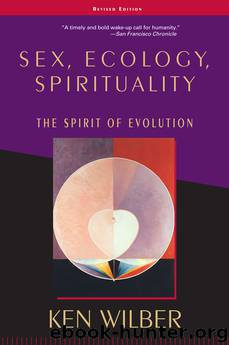Sex, Ecology, Spirituality by Ken Wilber

Author:Ken Wilber
Language: eng
Format: epub
Publisher: Shambhala Publications
13
The Dominance of the Descenders
It is the time of the gods that have fled and of the god that is coming. It is the time of need, because it lies under a double lack and a double Not: the No-more of the gods that have fled and the Not-yet of the god that is coming.
—MARTIN HEIDEGGER
BOTH THE EGO camps and the Eco camps, starting out with the best and even noblest of intentions, had paradoxically brought about precisely what they had set out to eradicate. The reason was fairly simple: since both camps were (and still are) playing on the same flatland field, then the more one pole succeeds, the more the excluded pole returns in paradoxical forms—the more the “return of the repressed (or regressed)” comes to haunt the house of its originator. Lacking a holarchical Ascent to (and Descent from) the nondual One—which negates and preserves both Ego and Eco in a Nondual transcendence and embrace—there was only a mutual negation, and mutual repugnance, of one camp for the other.
The integration of the Big Three (person, culture, nature), now that they had been finally differentiated: this was (and is) the single greatest task facing modernity (and postmodernity). In simplified form, what was demanded was the integration of the interior or subjective worlds (I and we) with the exterior or objective (Nature); or again, the integration of Ego and Eco.
The great differentiation had already, irreversibly, irrevocably occurred. What the world awaited, anxiously, was a voice signaling integration.
THE PARADOX OF DAMAGE
Both the Ego camps and the Eco camps had responded with their own healing agenda, only to find that both agendas aggravated what they were meant to soothe and inflamed what they were meant to cure. Both camps were their own worst enemy, and both camps contributed to a violent fracturing of the world they were supposed to heal.
We already saw that the rational Ego took as its goal the transformation from egocentric inclinations and ethnocentric dominator hierarchies to a worldcentric stance of universal pluralism, altruism, benevolence, and freedom. It was a “declaration of independence” in more ways than one: independence from religious and mythic domination, from state-imposed interference in personal life, from conformist modes of the herd mentality, and from nature conceived as a source of not-yet-moral drives and inclinations. The autonomy of the rational Ego had to be fought for, had to be actively secured against all those forces of heteronomy that constantly were at work to pull it down from its worldcentric stance of universal tolerance and benevolence.
These values—in particular, universal pluralism, altruism, and freedom—are what Taylor calls the three “hypergoods” (goods that are felt to be better than other goods) that have most deeply characterized modernity (and postmodernity), and they are values that no doubt constitute much of the true dignity of modernity. But no sooner had the rational Ego secured some notion of these hypergoods than it began not just to differentiate from other goods, but to alienate them, dissociate them, repress them, seal them off.
Download
This site does not store any files on its server. We only index and link to content provided by other sites. Please contact the content providers to delete copyright contents if any and email us, we'll remove relevant links or contents immediately.
| Anthropology | Archaeology |
| Philosophy | Politics & Government |
| Social Sciences | Sociology |
| Women's Studies |
The remains of the day by Kazuo Ishiguro(8999)
Tools of Titans by Timothy Ferriss(8395)
Giovanni's Room by James Baldwin(7346)
The Black Swan by Nassim Nicholas Taleb(7129)
Inner Engineering: A Yogi's Guide to Joy by Sadhguru(6794)
The Way of Zen by Alan W. Watts(6614)
The Power of Now: A Guide to Spiritual Enlightenment by Eckhart Tolle(5781)
Asking the Right Questions: A Guide to Critical Thinking by M. Neil Browne & Stuart M. Keeley(5775)
The Six Wives Of Henry VIII (WOMEN IN HISTORY) by Fraser Antonia(5515)
Astrophysics for People in a Hurry by Neil DeGrasse Tyson(5189)
Housekeeping by Marilynne Robinson(4447)
12 Rules for Life by Jordan B. Peterson(4304)
Ikigai by Héctor García & Francesc Miralles(4274)
Double Down (Diary of a Wimpy Kid Book 11) by Jeff Kinney(4272)
The Ethical Slut by Janet W. Hardy(4251)
Skin in the Game by Nassim Nicholas Taleb(4248)
The Art of Happiness by The Dalai Lama(4130)
Skin in the Game: Hidden Asymmetries in Daily Life by Nassim Nicholas Taleb(4006)
Walking by Henry David Thoreau(3962)
